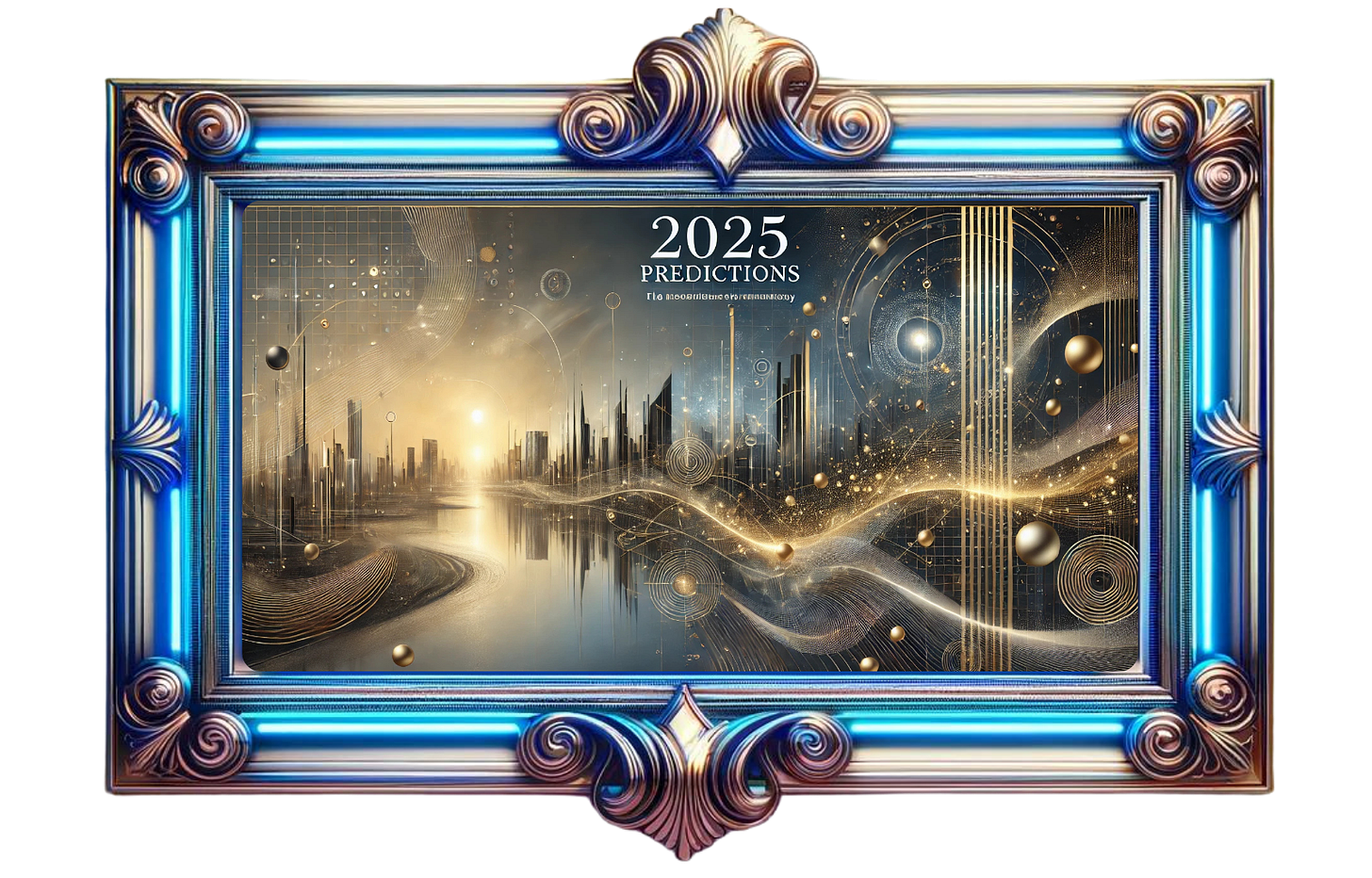As we come to the close of 2024, it’s impossible not to reflect on just how far we’ve come. At the start of this year, AI couldn’t even manage fingers or words properly in digital imaging—now, in less than 12 months, those hurdles are already behind us. The speed and scale of this change is nothing short of astonishing.
As we stand on the edge of a new year, it’s clear the next five years will transform our lives in ways we haven’t yet imagined. In that spirit, I’d like to share three predictions that I believe will define not just our relationship with technology, but how we connect, protect, and express ourselves in an evolving digital world.
1. Human Error Will Become Proof That You Are Human Online
Think back to early green screen effects in movies. At the time, they were jaw-dropping, but now we see the seams, the imperfections. Similarly, our eyes haven’t yet sharpened to this next wave of editorial AI. Soon, everything will be effortlessly perfect.
Did you take a picture with your eyes closed? There’s an app to fix that. Want to create a video out of text alone? Done. The tools for flawlessness will be everywhere, especially in how we connect online.
But perfection will breed skepticism. In 2025, I predict that imperfection will become a social currency. Blurry images, candid videos, and content that showcases raw, unpolished moments will trend because they prove something AI cannot yet replicate: human authenticity. Imperfections will become proof that we’re real—and in a world where digital perfection is the baseline, that will be the most relatable, trustworthy content of all.
And how might that shape us?
I think in many ways, it will be completely freeing—a renaissance, in a sense. For decades, we’ve been living under structures set in stone, a cultural pressure to perfect and perform, to polish our images until they gleamed with flawlessness. Now, that old mold is cracking.
Embracing your flaws has already been part of the conversation, but this time, it won’t be a movement—it will be a way of being. Imagine a world where we’re no longer striving for the perfect shot, but simply a real one.
How liberating could that be? It’s a shift that may not just change how we interact online but how we behave in real life. Will we dress differently, speak differently, share differently, knowing that the raw, imperfect version of ourselves is what resonates most?
I can’t wait to see how this evolution unfolds—how, in a digital landscape where perfection becomes suspicious, the art of simply being becomes our greatest asset.
2. A Huge Privacy Wave Is On the Horizon
When the digital world moves, it moves fast. It will only take one major digital breach or crime for a global push toward privacy and protection to erupt.
Digital imaging will be increasingly easy to fake. Bad actors will thrive on plausible deniability, while good people become vulnerable to impersonation, fake accounts, and misused information. For high-visibility individuals and industries—like real estate—privacy will become paramount.
I predict we’ll see a rising trend where luxury homeowners request their interiors not be posted online, valuing safety over social exposure. Protection will be as much about security as it will be about limiting how we engage in public spaces online.
The more digital tools enable us to complete tasks effortlessly, the greater the risk of exposure—and knowing where we need to protect ourselves will become as vital as knowing how to use these tools in the first place.
And how might that shape us?
On the marketing side, you might not be able to post houses anymore. That’s why I chose personal branding as my specialty—it’s where you’ll need to focus when the doors inevitably close. If you have to remove images of homes from your social profiles, do you have any content left? If the answer is yes, you’re already ahead of the curve—you’re doing your 80/20 rule.
However, this privacy wave will be seismic. We will be forced to actively learn where our exposures are. Vulnerabilities won’t be taught gently; they’ll be learned through injury. Unfortunately, it will be a man down scenario—society will take its lesson from the fallen. Proactive behavior will be rewarded, and those who can afford to be proactive will seize that advantage.
Anonymity will trend. People will lean toward facelessness as their public image online—not out of preference, but out of necessity. The shift will cause a growing fear, feeding into anxious herd mentality as we navigate this new reality of access, attack, and the maintenance of control.
This won’t just change what we share; it will change how we share. Privacy will be redefined—not as a passive luxury, but as an active strategy for protection. While the tools of exposure will multiply, those who stay mindful, cautious, and focused on building a personal brand without oversharing will find themselves on solid ground.
We’ll see how it unfolds, but one thing is certain: guarding yourself online will no longer be optional—it will be essential.
3. AI Agents Will Change Every Industry
“If you want to call me, have your AI call my AI, and we’ll set something up.”
Sound absurd? Give it a year. AI has already been integrated into every major platform: Google’s AI summaries, Meta’s AI assistants, and countless tools we use daily. But here’s where it’s going further: AI Agents.
AI Agents will soon help us complete tasks from start to finish. Think of a personal assistant that does more than organize a to-do list—it actually executes the steps. These agents will embed into tools we already use, automating workflows without requiring us to learn entirely new systems.
For example: Social media. Can you imagine Instagram not integrating AI to schedule mass posts or automate content strategy? The question isn’t if they’ll do it—it’s whether they’ll protect job ecosystems tied to these tasks.
The next few years will automate the “paper-pusher” jobs first, freeing us for higher-level opportunities. But it’s a trade-off: those ready to adapt and keep pace will gain the most from this shift. If we lean into learning these tools, we may find ourselves with more time to focus on creativity, strategy, and growth.
And how might that shape us?
You may not like to hear this, but this is what I see: a generational structure shift. We are about to lose a sense of hierarchy as we now know it.
For decades, success has been tied to expertise, years of experience, and slow, methodical learning. But when information is not only fully accessible but tools exist to execute on that information, the corporate agenda of speed and efficiency will triumph. If you know how to get the job done, you’ll be rewarded. If you know how to get it done faster than anyone else, you’ll be rewarded even more.
This is already showing up in education, where the cracks are becoming impossible to ignore. College systems, built on 10+ years of systematic education, are crumbling because of AI. Assignments that once assessed knowledge can now be completed instantly—with the right prompts.
The same failures and inefficiencies we see in education will soon appear in business. AI tools will challenge how we measure value, and success will shift from “who knows the most?” to “who knows how to delegate and use the tools best?”
So, here’s my suggestion for the next five years: learn to delegate, learn to prompt, and learn to integrate technology into your day-to-day.
The world is not returning to paper—unless energy becomes a scarce resource. Knowing how to navigate digital systems, use AI tools correctly, and execute faster than the person next to you will define the new hierarchy.
It’s not about outworking others anymore; it’s about outsmarting them. It’s like quicksand those who resist will struggle. It’s not a question of if this shift happens—it’s a question of how ready you are to rise within it.
Ready for the Shift?
None of this has to be scary. Change—especially change at this scale—will naturally put us on guard. We’ll seek authenticity because trust will feel harder to come by. We’ll limit exposure because we’ll value protection more than ever. And we’ll adapt to new tools that can both help and harm us, choosing to use them wisely.
My hope is that we move into this next year with strength and resilience. Let’s view the future not with fear, but with hope—hope that we can use these tools with integrity and intention. This is the time to learn not just how to wield AI offensively for opportunity, but defensively for protection.
We can’t control the world we live in, but we can choose to make a home out of the spaces we occupy. Let’s move into 2025 with purpose, balance, and an open mind for all that’s possible.
Let’s chat again soon…
Gibz
GibzMedia: SPOTIFY | YOUTUBE | INSTAGRAM | FACEBOOK | LINKEDIN






